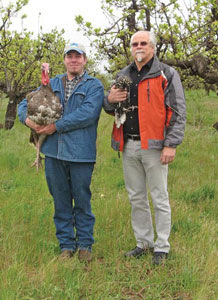This week, we're celebrating one-month of homemade foods by profiling cottage-food producers from throughout California. Today we're profiling the Chaffin Family, small-business owners in Oroville, CA and recent recipients of a license to sell food produced in a home kitchen. The article below is an excerpt from a larger article on AB 1616 that appeared in the Chico News and Review. I wish the Chaffin's the best as they continue producing healthy homemade food options for our communities.
Chico News and Review - Jan. 31, 2013
By Christine G.K. LaPado-Breglia
“...The primary thing that AB 1616 offers us is … being able to do things with dried fruit, you know, like chocolate-dipped, for gift packs and things of that nature,” said Chris Kerston, managing partner at Oroville’s Chaffin Family Orchards (go to www.chaffinfamilyorchards.com to learn more), in a recent telephone interview.
Ditto for making jam, which Chaffin Family Orchards produced before the passage of the California Homemade Food Act. “We’ve always had to rent a commercial kitchen for jam,” Kerston said. “If you go to a commercial kitchen, you’re renting for a particular date, once a month. You can’t save the culled fruit [for this purpose]—you have to take first-run fruit. If you’re making small batches of jam in a [home] kitchen, you can use culled fruit as the ‘waste’ fruit presents itself.”
 |
| Kerston brought up the example of peaches... which before AB 1616 "often would end up as livestock feed" simply because of appearance. |
“Now, we can do a small batch of jam every weekend after the farmers’ market, rather than a once-a-month date,” Kerston said. “We’re looking forward to taking advantage of this in summer.”
But even more important than the fact that the California Homemade Food Act allows small businesses to use home kitchens for food preparation, notes Kerston, is the fact that the new law increases access to healthful food.
As Kerston explained it, “The [food] movement right now is trying to go back to this old-fashioned, heirloom way of life, but the reality is, in our modern society, everyone’s really busy. Sixty years ago, every home had one person in the household whose sole job was to feed and clothe the family—and we don’t have that anymore. And that’s OK.
“But for this food movement to grow, and for people to have access to fresh, healthy food, we have to be able to offer them ready-to-eat foods. The more we can remove the barriers [to accessing fresh, healthful, ready-to-eat foods], the more people will have access to healthy foods.
“This is designed to be an incubator program,” Kerston added, of AB 1616. “It allows small businesses to see what works before renting a full-blown commercial kitchen and getting a staff and all those next steps of growth. It provides an opportunity to get some experience, some customer feedback before taking those next steps on growing your business.”
You can read this entire article and more at the Chico News and Review HERE
Mike Gatto is the Chairman of the Appropriations Committee of the California State Assembly. He represents the cities of Burbank, Glendale, La Canada-Flintridge, La Crescenta, Montrose, the Los Angeles neighborhoods of Los Feliz, Silver Lake, Atwater Village, and portions of the Hollywood Hills and East Hollywood. www.asm.ca.gov/gatto


Very significant Information for us, I have think the representation of this Information is actually superb one. This is my first visit to your site. Commercial kitchen rental in Chico
ReplyDelete